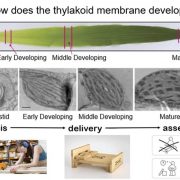Informational interview with Kevin Tran, Biotech Process Development Associate, Orchard Therapeutics
By John Tran, Conviron Scholar
Interviewer: John Tran, PhD Candidate in Plant Biology at MSU
Interviewee: Kevin Tran (Process Development Associate)
Masters – Biology in Stem Cell Research
B.S. – Biology in System Physiology
Academic meets Industry
John Tran sits down with Process Development Associate, Kevin Tran, who is working at the crossroads of start-up, biotech, and industry in the Bay Area.
The following has been edited for brevity and online publication.
What is your current job?
I am a Process Development Associate at Orchard Therapeutics, a biotech company in the Bay Area focused on innovating gene and cell therapy. I am involved in one of the main pipeline researching treatment for patients with a defective immune system otherwise classified as severe combine immune deficiency, or SCID.
Patients with SCID often have a deficiency for the enzyme adenosine deaminase, or ADA, and are unable to produce B cells. For patients with SCID, the disease is severe and a general cold can often be fatal.
What does you job entail?
I work directly in implementing our team’s cell culture platform. The blood sample we receive from patients are derived from bone marrow where stem cells are highly abundant. I operate our cell processing instrument (Prodigy by Miltenyi) to sort and specifically isolate CD34 cells.
CD34 is a transmembrane glycoprotein highly associated with stem cells but are also found in other cell types as well.
What skills have you learned from this job?
I have learned to further my skills in teamwork and communication as both are critical in the biotech industry. For example, teamwork and communication are imperative when our team prepares to run experiments on the blood samples aforementioned, which costs upwards of $50,000. Therefore, preparing a well-planned protocol for a bone marrow run is critical and setting up the experiment requires “all hands on deck” as the cell culture component which I oversee is only one of many.
How is industry different from academia?
My experience in academic research labs is that members often work in isolation – even within the same labs. Oddly, collaborations occur more often between individuals from two different labs than within. Within industry there is an emphasis on in-house collaborations as everyone is often focused on developing (and delivering) a single product.
In biotech there has to be a paper-trail.
Another notable difference between academia and industry is the degree of rigor involved in record-keeping and documentation. In biotech there has to be a paper-trail. For example, even something innocuous as a reagent used to resuspend lysophilized samples, which are sometimes primers, must be documented.
Furthermore, any change in a protocol has to be approved. Any change requires justification and explanation for approval (by the agency associated with the project). The regiment can slow the pace of biotech research.
What skills were required to obtain this job?
While my Masters degree was not required for my position, the degree did allow me to start at this position, which otherwise would have required 3 years of experience if I only had my Bachelors degree. The experience I gained from my Masters program which included reading scientific papers, understanding experimental controls, and managing an independent projects allowed me to start as a process development associate.
How would having a PhD impact your role?
For those interesting in working at a managerial or director level position, I highly recommend pursuing a PhD.
A PhD would allow me to further accelerate to higher levels within the company. Essentially, a PhD would put me on a fast(er) track for promotion, more so than what my Masters has already done for me. For example, having a Masters would require 10 years to reach a director level. Having a PhD cuts down that timeline. Being a director has many perks, such as greater degree on project input, intellectual contribution, and experiential design. Of course, me having a Masters allow me to propose ideas but a person holding a PhD ultimately makes the call. For those interesting in working at a managerial level, I highly recommend pursuing a PhD.






